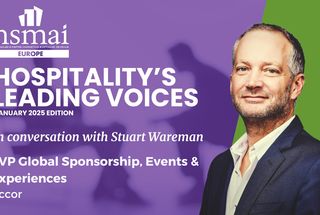Forging Emotional Bonds: Stuart Wareman’s Sponsorship Revolution at Accor
HSMAI's Hospitality’s Leading Voices: Series 4

This month, we’re excited to spotlight Stuart Wareman, SVP Global Sponsorship, Events & Experiences — the dynamic leader behind Accor’s global sponsorships, member experiences, and corporate hospitality.
From iconic partnerships with Paris Saint-Germain and Roland-Garros to unforgettable “money-can’t-buy” moments for loyalty members, Stuart shares how Accor’s sponsorship strategy builds emotional connections and drives loyalty like never before.
Introduction to the Role
Let’s start with the basics: What exactly does the role of Global SVP Experiences, Events & Sponsorship entail?
My role is centred on managing a global portfolio of major sponsorship investments. This includes partnerships with iconic names like Paris Saint-Germain, Roland-Garros, the Accor Arena, Accor Stadium etc.. I collaborate with regional teams to shape strategies that leverage these sponsorships to align with our brand and business objectives. Part of this involves creating unforgettable experiences for our loyal members, not only through these sponsorships but also in other areas, as a way to reward and delight them.
The Purpose of Sponsorships
It’s clear your role involves creating significant impact for both members and the brand. Let me ask, what’s the broader purpose behind these sponsorships? What value does it bring to the brand?
Sponsorship operates on multiple levels and addresses the entire marketing funnel. At the top, it’s about brand salience—being memorable and top of mind when people think about hotels. By connecting with people through their passions—be it sports, music, or culture—we create powerful emotional bonds that make our brand more memorable. It’s not just about awareness but also about understanding why people care about us.
So brand salience is the first priority. What comes next?
As we move down the funnel, the focus shifts to showcasing the benefits of being part of “ALL,” our loyalty program. We’ve redefined what experiences mean for a hotel company. Beyond memorable stays, we offer “Limitless Experiences,” a platform where members can exchange points for unique opportunities. For instance, they can take a tennis lesson with Jo-Wilfried Tsonga or enjoy a diverse range of experiences across key passions like sports, music, and gastronomy.
For members spending 90 to 100 nights a year in our hotels, the last thing they want is to redeem points for another stay. Instead, they’d rather share incredible moments with loved ones at events they’re passionate about.
Creating Memorable Experiences
That’s fascinating! It’s clear these experiences resonate deeply. Can you share an example?
One of our most popular experiences is bringing children to be mascots at Parc des Princes. It’s a “money-can’t-buy” moment, and it resonates deeply with our members. These connections go beyond loyalty; they enhance how much members value us, driving them to spend more and stay more often. It’s about recognition and creating exclusive opportunities that are truly memorable.
It’s amazing how these exclusive experiences build loyalty. Is this part of your value proposition when attracting potential hotels within Accor’s portfolio?
Absolutely. We strongly believe in what we call “augmented hospitality.”
The Concept of Augmented Hospitality
Can you remind us what “augmented hospitality” means?
It’s about offering services beyond just a hotel stay. This includes mobility, integrating the entire travel journey, and even providing value when guests aren’t traveling. Through “ALL,” we’ve built a coalition of partnerships where points become a fluid currency. Members can use them for flights, taxis, or other experiences with partners like SNCF, Air France, or Fever—a platform offering access to thousands of events worldwide, from Netflix experiences to NBA games. It’s like having the next generation of concierge services for everyday life.
So it’s about maintaining a relationship with the customer even when they’re not traveling?
Exactly. Hospitality is not a frequent purchase for most people. The more touchpoints we create with our key members, the “stickier” we become. It’s a virtuous cycle—more engagement leads to more loyalty and higher value for both parties.
Beyond Sports: Expanding Sponsorship Focus
Sponsorship often evokes sports, but it’s broader than that, isn’t it?
Much broader. While sports are a significant component, they’re not the only focus. A partner once pointed out that half the fans leave a sports game disappointed because their team lost. But at a concert, everyone leaves happy, having seen their favourite artist. Music creates a more emotional and memorable connection. By working with venues hosting diverse events, we provide variety and access for our members, broadening our reach.
Strategic Approaches to Partnerships
How do you approach creating a partnership?
There are two approaches. Reactive—when an opportunity comes to us, we evaluate its fit with our strategic goals and existing portfolio. Proactive—where we identify a business or brand challenge and explore solutions, which might include sponsorship, partnerships, or advertising. We’re very intentional in selecting the right tool for the challenge.
Do you follow a global strategy?
We encourage regions to leverage existing assets rather than starting from scratch. It’s about maximizing efficiency by using intellectual property rights we’ve already secured and scaling those globally.
Role of Technology and Data
ou mentioned using data to inform decisions. How does technology shape your approach in sponsorship and beyond?
Sponsorship is both science and art. Data informs decisions—understanding what resonates with specific audiences—but creativity ensures we create relevant, compelling connections. It’s not about “batch and brag.” Fans see through that. True engagement comes from adding unique value to their experience and integrating our brand meaningfully.
Skills and Success in the Role
Your role spans so many disciplines. What would you say are the most critical skills to thrive in this role?
Strategic marketing is foundational. Relationship-building is key—internally and externally. You need commercial acumen to measure returns and know when to pivot if something isn’t working. Negotiation skills are crucial for securing contracts, as is team management to keep everyone aligned and motivated. Lastly, storytelling—presenting data and ideas compellingly—is vital for gaining buy-in.
How do you measure success?
We conduct annual brand studies across 14 markets, measuring awareness, brand love, and associations with sponsorship properties. We also benchmark marketing effectiveness and track loyalty member behaviours, comparing those who’ve redeemed points for experiences with those who haven’t. These metrics help us refine our approach and validate partnerships.
Involvement with the European Sponsorship Association
You’re also a board member of the European Sponsorship Association (ESA). What does ESA do?
ESA sets standards and serves as the central community for sponsorship professionals. We offer resources, courses, and networking opportunities. Sponsorship is a relationship-driven field, and ESA helps professionals grow and connect.
Career Journey and Advice
How did you end up in hospitality?
My journey started after university when I worked abroad for a tour operator. I moved into PR, focusing on travel and sports, before transitioning into sponsorship consultancy. One of my clients was in hospitality, and I eventually joined their team. Recently, I made the move to Paris to join Accor. It’s been a fantastic step forward.
Moving to Paris must have been a big adjustment. What about the cultural shift—how did you adapt?
It’s been a rewarding challenge. Stepping out of your comfort zone builds resilience and adaptability. Navigating a new culture and language expands your perspective and unlocks creativity. Ironically, my French boss is based in London!
What would you tell young people about joining the hospitality world?
Hospitality offers transferable skills—resilience, adaptability, empathy, communication—that are valuable in any career. It’s not just a “stop-gap job.” There are clear pathways for growth. For example, one of my former bosses started as a cook and became COO for an entire continent. We also have programs to recruit individuals from disadvantaged backgrounds, helping them progress quickly. Hospitality provides opportunities to travel, see the world, and experience amazing things. And the people are genuinely wonderful to work with. It’s definitely a great and unique industry!
About Philippe Roy: He’s a contributor of HSMAI Europe and the founder of Red Yucca, an Advisory Services firm helping companies and merchants reduce their cost of accepting payment cards. It has a deep expertise on Influence Strategies, Complex Negotiation, Value Propositions and Relationship Management. It operates both locally and globally. Philippe is also a new member of the upcoming HSMAI Europe France Advisory Board.
About Stuart Wareman: Based in Paris, Stuart leads a team coordinating and managing the hotel group’s global sponsorships, member experiences and corporate hospitality. The portfolio includes Paris Saint-Germain, Roland-Garros, the Accor Arena, ASM, the Accor Stadium, SailGP, as well as multiple entertainment venues and food festivals around the world. Other recent major event associations include the Paris 2024 Olympic and Paralympic Games, Rugby World Cup France 2023 and the French challenge for the Americas Cup. Before Accor, Stuart worked for nine years in hotel sponsorship, loyalty partnerships and co-brand credit cards, and spent over 12 years in sponsorship consultancy (WPP) and consumer PR agencies. He is also a Board Director of the European Sponsorship Association (ESA) since 2017.
